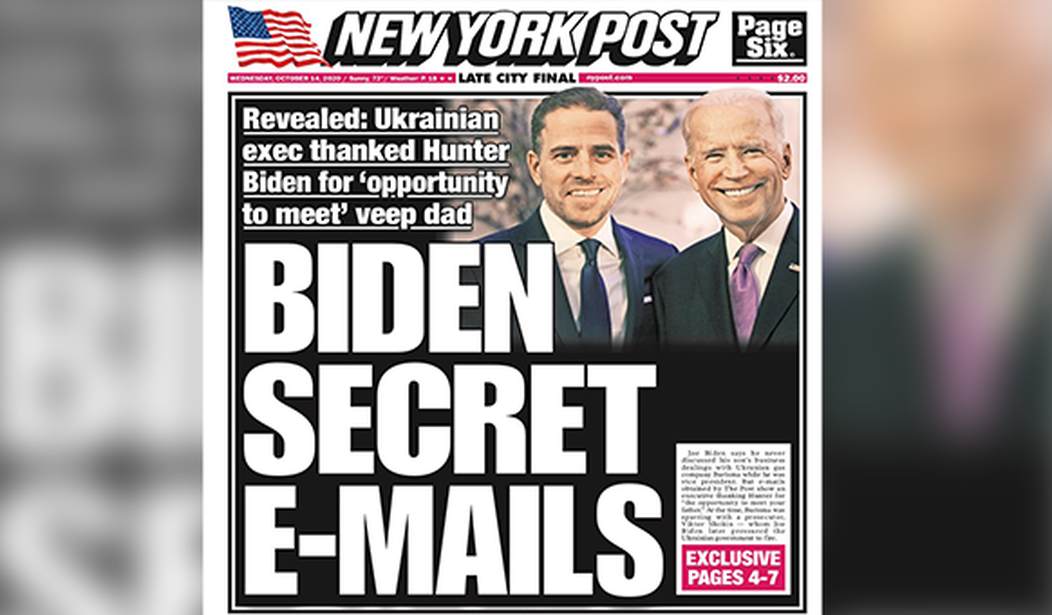
51 is an interesting number, isn’t it? It’s one shy of a deck of cards. It’s the mysterious “Area” where a top-secret U.S. military installation associated with UFOs is located. It’s exactly three times the number of intelligence agencies who confirmed Russia tried to interfere in the 2016 election. It’s a large number — an impressive one, even. And when 51 current and former intelligence officials sign and publicize a letter, it’s designed to get your attention and, undoubtedly, persuade you of the import of what is being said.
And so it did — for many Americans, the characterization of the Hunter Biden laptop emails as bearing “all the classic earmarks of a Russian information operation” by dozens of intelligence officials (who surely could be trusted, right?) allowed them to confidently wave off the New York Post’s blockbuster story and the corroboration provided by Tony Bobulinski as not just false but likely the work of the Russians, thus making it virtually incumbent on them to reject it and vote accordingly.
But just as Hunter’s abandoned laptop eventually proved to be legit, recent testimony from former acting CIA Director Mike Morrell before the House Judiciary Committee highlighted a direct line between Joe Biden’s 2020 campaign and the letter’s genesis. (You don’t say?!)
Ever since Matt Taibbi and Michael Shellenberger testified before Congress in March, I’ve become a fan of Taibbi’s weekly podcast with Walter Kirn, “America This Week.” In last week’s episode, which arrived on the heels of the latest Morrell revelations, Taibbi and Kirn pondered the role of the famed 51, remarked on the fact that the entire endeavor was neatly put together and publicized in a matter of days (leaving virtually no time for any investigation into the material on the laptop), and noted that rather than holding intelligence officials up as authorities, we ought rightly be suspect of their messaging, given that it’s literally their job not to tell the truth. If I recall correctly, they also questioned whether there were other intelligence officials who didn’t sign the letter (given that so stinkin’ many did).
That set me to wondering about that too: If 51 current and former intelligence officials signed off on the misleading letter, was there anyone left who didn’t? It called to mind that scene from “In & Out” where Joan Cusack’s dumped-at-the-altar bride screams out to the night: “Is everybody gay?!”
[embedded content]
(Okay – odd reference, I know. That’s just how my brain works sometimes.)
But it’s a legit question: If 51 officials signed the thing (merely at the behest of Morrell and without independently investigating the situation), were there any who declined to do so? And if so, why haven’t we heard from them?
Enter Dan Hoffman, former CIA station chief. On Thursday, he penned an OpEd in the Washington Times titled: “Why I didn’t sign the Hunter Biden laptop letter.” In it, Hoffman explained that between concerns over his wife’s health and his unease with signing his name to something he’d not independently verified, he wasn’t comfortable signing off on the letter, so declined to do so. From his OpEd:
When I served at the CIA and we did not know an answer to a policymaker’s query, we asked our sources for more information in pursuit of more informed executive decision-making. Even as Mr. Morell was circulating the letter, then-Director of National Intelligence John Ratcliffe was saying publicly that the Hunter Biden laptop was “not part of some Russian disinformation campaign.”
The letter I was being asked to sign clearly stated: “We do not have evidence of Russian involvement — just that our experience makes us deeply suspicious that the Russian government played a significant role in this case.”
U.S. intelligence analysts needed more time to conduct forensics on the laptop and for the FBI to complete its investigation and unravel the details, especially the convoluted part about the computer having been found at a repair shop in Delaware.
READ RELATED: Former Los Angeles Mayor Richard Riordan Dead at 92
But the email I received from Mr. Morell did not invite any further discussion or debate. The letter was a fait accompli. It was being passed around for signatures, not edits.
I’ve never been one to put my name to words someone else wrote on my behalf. Moreover, I was focused at the time on other, more important priorities: My wife, Kim, was late into her third year of fighting cancer, which would take her life in a few months. She entered hospice care a couple of weeks after the presidential election.
And so, I did not sign the letter and never responded to the email.
Okay – so now we know there was at least one — and Hoffman is certain there were others. He joined Fox News’ John Roberts Friday afternoon to discuss his OpEd and the reason he wasn’t willing to sign on to the letter.
[embedded content]
During their exchange, Hoffman indicated that he received the letter on October 18, 2020, and, at first glance, it seemed natural to lay the blame for the laptop at the Kremlin’s doorstep. But there was no evidence of Russian involvement — which the letter noted (though the media and Joe Biden were seemingly comfortable intimating otherwise) – and he felt like there needed to be a forensic analysis of the laptop and its contents in order to properly determine its origins.
He remarked again on the convoluted nature of how the laptop came to the public’s attention and reiterated that he simply felt he needed more information. He did note that “There were many others who didn’t sign it,” though he didn’t name names. (Perhaps someone should follow up with Mr. Hoffman — does he still have the email/communication from Morrell inviting him to sign the letter? Were other officials cc’d on that correspondence? Has he spoken with others who’ve said they declined the invitation? Or is he just basing that on the number who actually signed versus the number who received it?)
He also explained that when he was at the CIA, they would sit in Mike Morrell’s office and hash out complicated issues. In contrast, there was no debate invited here. As someone who spent many years focused on Russia, Hoffman was a little surprised he and others with similar backgrounds weren’t involved in the discussion prior to being asked to sign the letter.
Hoffman also emphasized the importance of distinguishing between retired and active officials, noting that even those actively serving vote, but they serve and fulfill their duties regardless of who the president is and don’t (or aren’t supposed to) allow politics to determine how and whether they do that. On the other hand, retired officers can engage politically, as long as they don’t reveal classified intelligence.
Hoffman stated that he did not know that Morrell had discussed the letter with now-Secretary of State Antony Blinken (who was then with the Biden campaign) and agreed that basically drew a straight line from that communication to the letter’s publication to Joe Biden’s use of it at the debate.
Lastly, Roberts asked Hoffman: “Why’d you wait two years?” Hoffman responded that it was Morrell’s testimony that changed his calculus. In other words, when he realized that Morrell had organized the letter at the behest of Blinken/the campaign, he saw that direct line and felt compelled to speak out about it.
For what it’s worth, I appreciate Mr. Hoffman speaking out and hope his doing so might encourage some of those others who opted not to sign the letter to do so as well. But I’m left a bit bemused about this. I’m just a simple former lawyer/now editor/writer who follows politics. And it didn’t take Morrell’s recently revealed testimony for me to connect those dots. That just confirmed what I’d long suspected. So I have a little difficulty believing it took experienced intelligence officials until now to realize what went on here and to decide it might be worth saying something.
The opinions expressed by contributors are their own and do not necessarily represent the views of RedState.com.
Source:




